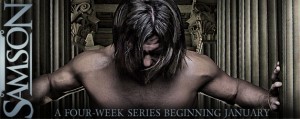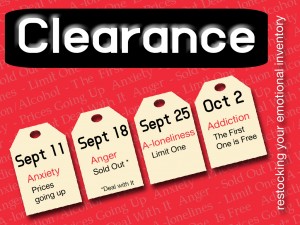
Samson – Emotional Strength *
Sycamore Creek Church
January 12/13, 2014
Tom Arthur
Peace friends!
Today we continue a series exploring Samson, the judge of Israel who had high highs and low lows. Samson was set aside at birth for God to save the people from the Philistines. Israel had become so closely connected and assimilated with the Philistines that they were at risk of losing their own identity and God’s call on their lives. Samson was a man of great potential but made self destructive decisions. He was an incredibly strong man with a dangerously weak will. Last week we saw that he struggled with lust (I want it!), entitlement (I deserve it!), and pride (I can handle it!). In the midst of those struggles this strong man became weak. Today we’re going to explore a further key idea in Samson’s life:
Samson was emotion-driven not Spirit-led.
Now it may seem odd to say that a man known for his strength was emotion-driven. We men don’t like to think of ourselves as emotional. We say that women are emotional, and men are strong. But this isn’t really true. The difference is more about how men and women process emotion. Women talk. Men act. Women say, “Come over and have tea so we can talk.” Men do beer and balls…football, basketball, baseball, hockeyball.
Let me give you an example from my own marriage. Here’s the difference between parenting styles with me and Sarah when it comes to potty training. Sarah likes to talk it out with Micah: “Micah, do you need to go potty? Micah, don’t you think you should give it a try? Micah, it’s so much easier to go potty than to change a diaper.” She tries to creatively cajole him into it. The more frustrated she gets the more she talks to him about what he should do. Here’s how I make it work: “Micah, go sit on the potty.” If he doesn’t go, I pick him up and make him go. The more frustrated I get, the fewer words I use and the more I rely on physical power to persuade. Sarah: Creative Cajoler. Tom: Physical Power to Persuade.
While generalizations are not always true, this one can be helpful for our exploration of Samson today. Too often men allow their emotions to lead their actions. You need to engage with kids when you get home, but you sit in front of the TV because you’re emotionally fried after working hard. You do or say something and should apologize, but you don’t because of pride. Someone angers you and you explode in anger even though you know you shouldn’t.
Paul, the first Christian missionary said:
Live by the Spirit, I say, and do not gratify the desires of the flesh. For what the flesh desires is opposed to the Spirit, and what the Spirit desires is opposed to the flesh…
Galatians 5:16-17 NRSV
Emotions aren’t always bad, in fact they’re a gift. But when we let our emotions take over, they become the “flesh” that Paul is talking about that is opposed to God’s Spirit at work in us.
So let’s get to Samson. We find in the story of Samson a battle of the riddle. Samson has a competition with a bunch of other guys around a riddle. Do men always have to compete? But he doesn’t leave it at a competition. He adds a bet. Do men always have to bet to make the competition fun? Here’s the riddle:
Out of the eater came something to eat.
Out of the strong came something sweet.
Judges 14:14 NRSV
So the answer to this riddle is a lion and honey. Samson killed a lion, came back later and found in its corpse a bunch of bees and honey. The Philistine men can’t figure it out, so they threaten Samson’s Philistine wife (not Delilah), and she cries to Samson and gets the answer from him. He tells her, and she tells them. They solve the riddle and Samson is furious. He says:
If you hadn’t plowed with my heifer, you would not have found out my riddle.
Judges 14:18 NRSV
OK, guys. First, don’t let another guy plow with your wife. Second, don’t call your wife a heifer! Instead of being led by the Spirit, Samson becomes driven by his emotion, particularly his anger. He takes the lives of 30 innocent men to pay his bet. Samson then leaves the party, and his wife’s dad thinks that he’s abandoned his daughter so he gives her to another man. Samson comes back several weeks later and finds that his wife has been given to someone else. So he takes 150 foxes, ties them together, lights their tails on fire, and sets them lose in the Philistine grain fields. Philistines become furious and burn Samson’s wife and her dad.
Anger leads to a destructive cycle of violence in Samson’s life and becomes Samson’s default emotion. But what did Samson have to be angry about? He chose to marry with “uncircumcised Philistines” (this is a religious distinction not ethnic distinction), against his parents’ advice. He picked the riddle. He gave the answer away. He took the foxes to burn the field. Who should Samson be angry with?
Too often anger becomes the default emotion of many men. We’re angry at the world, when we should be angry at ourselves. We end up taking it out on someone else. My wife won’t meet my physical needs, but have you met her emotional needs? My kids don’t want to spend time with me now, but did you spend time with them then? I’m angry at God about my circumstances, but they are the natural consequences of my choices. Let’s call it what it is: I need forgiveness. I need accountability. I need to apologize to my kids, my wife, my boss, etc., and I need make real changes. [Side note: wives, when your husband apologizes, receive the apology. You are on humble ground. Yes, keep your expectation of changed behavior, but an apologizing husband is a humbled husband.]
The anger and violence in Samson raises all kinds of questions about God, God’s people, and how God works in our world. We read:
The spirit of the Lord rushed on him, and the ropes that were on his arms became like flax that has caught fire, and his bonds melted off his hands. Then he found a fresh jawbone of a donkey, reached down and took it, and with it he killed a thousand men.
Judges 15:14-16 NRSV
How can God’s Spirit give him power and he be so violent? Here’s a distinction that is very important to understand. We can have the gifts of God’s Spirit in us and lack the fruit of God’s Spirit. What do I mean? Think about that passage about love that gets read at every wedding you’ve ever been at. It’s from Paul’s first letter to the Corinthians and it says:
If I speak in the tongues of mortals and of angels, but do not have love, I am a noisy gong or a clanging cymbal. And if I have prophetic powers, and understand all mysteries and all knowledge, and if I have all faith, so as to remove mountains, but do not have love, I am nothing. If I give away all my possessions, and if I hand over my body so that I may boast, but do not have love, I gain nothing.
Corinthians 13:1-3 NRSV
You can have the supernatural gift of tongues and speak in all kinds of language but without love, you’re a noisy gong. You can prophecy about the future in miraculous ways, but without love you’re nothing. You can have amazing faith in God, but without love it’s nothing. You can choose voluntary poverty and asceticism, but without love you’re really poor. In other words, God gives all of us gifts, some of them quite impressive on the outside, but the character traits of God’s Spirit—love, joy, peace, patience, kindness, generosity, faithfulness, gentleness, self-control—may be totally absent. We can have external excellence and internal rot. We are then white-washed tombs.
Angry, violent and abusive men are often loved by many, and many are surprised to find that at home they verbally or physically abuse their wives. Powerful spiritual leaders can lead secret sinful lives (which is really most of us!). Samson is super strong but without love he is just an aggressive animal, a violent tyrant, a brutal bully. To be Spirit-led is to have not just the gifts of God’s Spirit at work in us but also the fruit, to have the talent and the character of Christ.
I have had to wrestle with anger myself. I’ve had to look at the rot in my own life. Anger has raised its head more often that I would like. Something I’ve come to notice is that anger is not the opposite of love, apathy is the opposite of love. Anger and love are often very closely related. In fact, anger by itself isn’t necessarily bad. One book I read suggested that anger is a physiological readiness to respond (Neil Clark Warren, Make Anger Your Ally). Anger is actually a secondary emotion to frustration, fear, or hurt. Anger has a lot of power in it, but we need to take that power and put it purpose, to let it be Spirit-led rather than destructive. Paul tells us:
Be angry but do not sin.
Ephesians 4:26 NRSV
Anger by itself is not a sin. It’s what you do with the anger. Will you let it be led by the character of Christ in you? Let me suggest from my own wrestling with anger a To Do List and a To Don’t List. First the To Don’t list:
To Don’t List
- Don’t curse at your loved ones. When was the last time you called your wife a word that better describe a female dog? Don’t ever call your wife a B#%^&. Don’t do it. Just don’t. It’s not kind or gentle. Don’t aim any curse words at her. Don’t use aggressive language to try to motivate your wife or your kids. That’s being emotion-drive rather than Spirit-led.
- Don’t belittle your loved ones. Don’t tell your loved ones how bad they are. Don’t tell them they’re worthless or won’t amount to anything. Don’t tell your wife this or your kids. Don’t tear down your family with your words. That’s being emotion-driven, not Spirit-led.
- Don’t use physical power to coerce your wife. Don’t try to get your wife to do what you want her to do by treating her like she’s a toddler. You don’t pick your wife up and move her. She is her own person. You don’t discipline your wife as though she were a child. You don’t hit your wife in any way. This is being emotion-driven rather than Spirit-led.
- Don’t always use physical power with your kids. If your go-to method of discipline with your kids is always physical power, you are allowing anger to drive you rather than creative loving discipline. Yes, restraint is often warranted. Holding your kids back from hurting themselves is one thing. Hitting them or pushing them is another. If you find yourself not being very creative in your discipline and resorting to physical power over and over again, you’re being emotion-driven rather than Spirit-led.
To Do List
- Slow it down. When you’re angry, you’ve got to slow things down. Emotions and decisions can add up quickly. How do you slow it down so that you can be Spirit-led rather than emotion-driven? Here’s how…
- Walk away and cool down. When you get angry you enter into a state of being flooded. When your heart-beat gets over 100BMP, all kinds of things are happening in your body with adrenaline and hormones. You won’t think straight when your heartbeat hits 100BPM. You’ve got to walk away and let your body get back to a normal state so that you’re Spirit-led and not emotion-driven.
- Ask yourself: “What do I really want?” That’s a key question that often gets lost amidst anger. The end goal gets missed and short-term goals of dominating the moment take over. “What do I really want?” requires you think about what God really wants in that situation, and that’s being Spirit-led rather than emotion-driven.
- Come back and talk it out. Take the initiative to come back. Take the initiative to talk it out. Don’t let your wife be the one who always brings difficult topics up. Be a leader in your family. Talk about the hard stuff. God is in the hard stuff. That’s being Spirit-led rather than emotion-driven.
- Identify and be aware of anger triggers. Notice over time what things or situations trigger anger in you. Consider keeping an anger journal. The more aware you are of your anger triggers, the more you can use the power of anger to Spirit-led purposes rather than emotion-driven action.
- Use your anger to give you power to creatively seek what you want (long-term) rather than the short-term (explosion). Use the power of anger to motivate you to find creative ways to discipline your kids (ask for help!), creative problem solving with your wife (ask for help!), and loving solutions. Love is looking for the solution you would want if you were the person you were angry with. That’s being Spirit-led rather than emotion-driven.
- Let your need drive you to God, and God will meet your deepest need. Acknowledge you are in need. Back to Samson:
By then he was very thirsty, and he called on the LORD…
Judges 15:18 NRSV
This is the first time that Samson called on the Lord through all of this! He basically ignores God through this entire angry outburst with the Philistines, but when he finally acknowledges his need for water—a need that he can’t solve by himself—he meets the Lord again.
Men, when you call out to God, God’s strength comes in your weakness. You can be a Spirit-led man of strength (gifts) and love (fruit) rather than an emotion-driven man of anger. Acknowledge your need for God today and let the Spirit of God make you strong in love for God, love for your family, and all those around you.
God, may it be so in the lives of every man today. Amen!
* This sermon series is based on a series by Craig Groeschel





Recent Comments